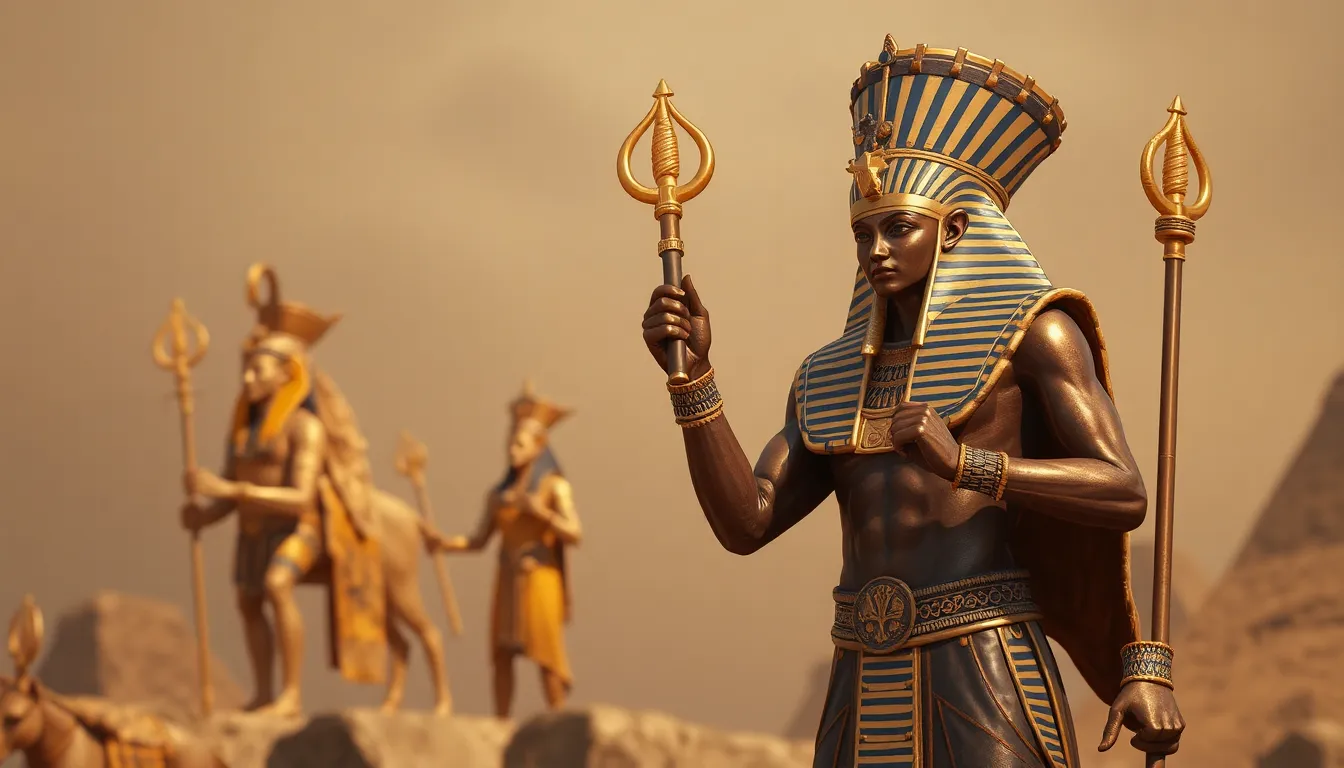Unraveling the Myths: The Protective Powers of Egyptian Gods
I. Introduction
Egyptian mythology is a rich tapestry of stories, beliefs, and deities that played a crucial role in the lives of the ancient Egyptians. It offered explanations for natural phenomena, guided moral conduct, and provided insight into the afterlife. Among the myriad of gods and goddesses, many were revered for their protective powers, safeguarding the living and the dead alike.
The purpose of this article is to explore the protective aspects of key Egyptian deities, delving into their roles and the myths that surround them. We will examine gods such as Anubis, Isis, Horus, Thoth, and others who played pivotal roles in ensuring safety and security in various forms.
II. The Nature of Protection in Egyptian Beliefs
In ancient Egypt, protection was not merely a physical concept but intertwined with spiritual beliefs. The Egyptians believed that the gods actively participated in the protection of individuals, communities, and the realms of the living and the dead.
The role of gods in safeguarding life was multifaceted. They provided protection against evil forces, misfortune, and danger. Additionally, protection extended into the afterlife, where deities assisted souls in their journey through the underworld.
Amulets and artifacts played an essential role in these protective beliefs. The Egyptians crafted numerous talismans, each imbued with the power of specific deities, to ward off evil and bring good fortune. Some common protective symbols included:
- Scarabs: Symbolizing rebirth and protection
- Eye of Horus: Offering health and protection
- Ankh: Representing life and immortality
III. Anubis: The Guardian of the Afterlife
Anubis is one of the most recognized deities associated with protection in ancient Egyptian mythology. Known as the god of mummification and the afterlife, Anubis played a vital role in funerary practices.
Myths surrounding Anubis depict him as a protector of souls, guiding them through the perilous journey to the underworld. His presence was essential during the weighing of the heart ceremony, where he ensured that the deceased were judged fairly.
The symbolism of the jackal, which Anubis is often depicted as, is deeply connected to protection. Jackals were known to scavenge graveyards, and their association with the dead made Anubis a fitting guardian for those who had passed.
IV. Isis: The Motherly Protector
Isis is one of the most powerful and revered goddesses in Egyptian mythology, embodying motherhood, fertility, and magic. Her multifaceted role includes being a protector of the pharaohs and the people of Egypt.
Myths often highlight Isis’s protective powers, especially concerning her son, Horus. After the death of Osiris, Isis’s determination to protect and raise Horus portrays her as a fierce maternal figure. She used her magical abilities to shield him from harm, particularly from Set, who sought to destroy him.
The significance of her protective spells and rituals cannot be overstated. Egyptians often invoked Isis in prayers and rituals for protection, believing that her powers could safeguard them from dangers and misfortunes.
V. Horus: The Avenger and Defender
Horus, often depicted as a falcon or a falcon-headed man, symbolizes kingship, protection, and the sky. As the son of Isis and Osiris, he embodies the dual roles of avenger and defender.
The myths surrounding Horus’s battle against Set are central to his identity. This fierce conflict was not just a personal vendetta; it symbolized the struggle between order and chaos, light and darkness. Horus’s victory represented the triumph of good over evil, and he became a protector of the pharaohs, ensuring the stability of the kingdom.
The Eye of Horus, a powerful symbol of protection and royal power, was often used as an amulet. It represented healing, safety, and the protective watch of Horus over the people.
VI. Thoth: The Wise Protector of Knowledge
Thoth, the god of wisdom, writing, and knowledge, played a crucial role in safeguarding truth and order in the universe. He was often depicted as an ibis or a baboon, animals associated with intelligence and communication.
In myths, Thoth is credited with protecting the souls of the deceased by recording their deeds and ensuring the proper administration of justice in the afterlife. His wisdom was vital in maintaining the cosmic balance, and he was often called upon for guidance.
The significance of writing and knowledge in ancient Egypt also served as a form of protection. Scribes, who were seen as the bearers of Thoth’s wisdom, were highly respected, and their ability to write was believed to have protective and magical qualities.
VII. Other Notable Protective Deities
In addition to the primary deities discussed, several other gods and goddesses held protective powers in Egyptian mythology:
- Bastet: The feline goddess of home and family, Bastet was revered for her protective qualities over domestic life and motherhood.
- Sekhmet: As a warrior goddess, Sekhmet embodied the fierce aspect of protection, often invoked in times of war and conflict to safeguard her followers.
- Neith: The goddess of war and hunting, Neith was considered a protector in battle, both for warriors and the pharaohs leading their armies.
VIII. Conclusion
Throughout Egyptian mythology, the protective powers of the gods illustrate a profound understanding of safety, both in life and in the afterlife. Each deity played a unique role, contributing to a rich spiritual framework that emphasized the importance of protection.
The enduring influence of these myths continues to resonate in modern culture, inspiring literature, art, and spirituality. The stories of Anubis, Isis, Horus, Thoth, and others serve as a reminder of the timeless human need for protection and guidance.
We encourage you to delve deeper into Egyptian mythology to uncover more insights into the protective forces that shaped the beliefs and practices of this ancient civilization.




